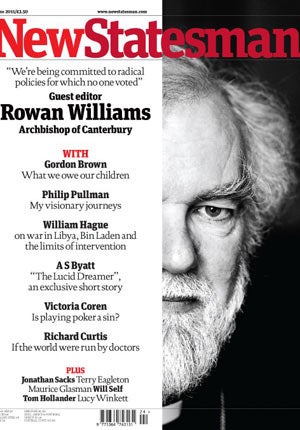Cameron leads backlash against Archbishop

David Cameron led a Government backlash against the Archbishop of Canterbury's stinging criticism of the Coalition's policy programme yesterday. The outspoken comments from Dr Rowan Williams, in which he protested that ministers were driving through radical policies not put to the voters, infuriated Downing Street.
The row between Church and state intensified as the Prime Minister said he "profoundly disagreed" with the remarks and cabinet ministers suggested he was out of touch. But Dr Williams won the backing of other bishops who said he was right to raise concerns about Government policies.
The Archbishop delivered his damning critique in an article in the New Statesman magazine, which he guest edited this week, warning that ministers faced "bafflement and indignation" over their plans to reform the National Health Service and schools. He said: "With remarkable speed, we are being committed to radical, long-term policies for which no one voted."
Dr Williams said there had been a "quiet resurgence of the seductive language of 'deserving' and 'undeserving' poor" and "steady pressure to increase what look like punitive responses to alleged abuses of the system".
He criticised Mr Cameron's vision of a Big Society, writing: "The widespread suspicion that this has been done for opportunistic or money-saving reasons allows many to dismiss what there is of a programme for 'big society' initiatives; even the term has fast become painfully stale." He added: "Government badly needs to hear just how much plain fear there is around questions such as these."
Mr Cameron said the Archbishop was entirely free to express "political views" and make "political interventions". But he added: "I profoundly disagree with many of the views that he has expressed, particularly on issues like debt and welfare and education."
He insisted his Government was acting in a "good and moral" manner. He said: "I don't think it is good or right for people and our country if we just give up on paying down our debt and just pass that down to our children. I don't think it is good or right for us to pay people to stay on welfare, trapped in poverty, when we should be trying to get them a job."
Iain Duncan Smith, the Work and Pensions Secretary, said the comments were "a little unbalanced and unfair", suggesting Dr Williams was detached from ordinary life.
Downing Street was particularly stung by the comments about the Big Society, which Mr Cameron has advocated since he became Tory leader in 2005. "We would welcome the Church's ideas for making the Big Society work. He has just issued a simplistic political statement about cuts," an insider said.
The Tory MP Gary Streeter said: "The people are with us on this and the Archbishop, sadly and unusually for him, has ill-judged his attack."
But the Bishop of Guildford, the Rt Rev Christopher Hill, said the comments were "entirely reasonable". He said: "Government cannot at any stage simply abrogate its responsibility. One of the prime, core functions of government is the care of all in society, especially those at the bottom."
Join our commenting forum
Join thought-provoking conversations, follow other Independent readers and see their replies
Comments
Bookmark popover
Removed from bookmarks